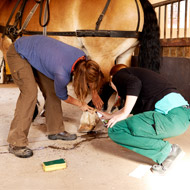
BEVA's Internship Awareness Programme aims to give young equine graduates as much support as possible
BEVA's Internship Awareness Programme (IAP) has proven to be an indispensable tool for graduates, with over 4,000 website page views in the past year.
The IAP increases exposure of veterinary opportunities to new graduates and allows universities and equine veterinary practices to distribute the right information to the right applicants.
The programme, launched at Congress 2013, was set up in response to an industry survey which revealed that up to five times as many veterinary graduates may be looking for work in equine practice, than there are jobs available.
The IAP aims to give young graduates as much support as possible to help them make the most informed decisions at this stage of their careers. BEVA say that, in the longer term, the provision of guidelines on internship structure and delivery should help practices - not only in terms of efficiency, but also to develop their reputations as centres of excellence in training.
Together with basic information on what they offer, the type of candidate sought and how to apply for the positions, the provision of a detailed list of current equine veterinary internship providers makes it easier for graduates to view and compare what options are available to them.
The IAP working party, which comprises of BEVA Council members and representatives from university and practice, is also working to set up common and specialised training initiatives that can allow potential applicants to select postgraduate training that best matches their career goals.
Vicki Nicholls, BEVA Council member and IAP working party member, said: "As a past intern, I am passionate about ensuring best clinical practice and working conditions in UK clinical internships. The paucity of growth in the equine job market, coupled with the development of new vet schools, has highlighted the absolute need for BEVA-led, new graduate support.
My career has only been possible with the support of some fantastic mentors and their guidance and it is my aim to ensure all BEVA members have access to the same encouragement and care."
Amber Whitmarsh BSc(Hons) BVSc MRCVS and Ella Tappenden BVs MRCVS both found their internships through the IAP.
Ella said: "IAP makes it much easier to find the right internship. We are both thoroughly enjoying our time at the Philip Leverhulme Equine Hospital, where we are learning and developing our skills in a supportive and friendly team of specialists."
A full list of current providers of internship programmes in the UK can be viewed online at www.beva.org.uk.
Image (C) BEVA



 The veterinary mental health charity Vetlife is inviting the veterinary community to join it for a sponsored cold-water dip.
The veterinary mental health charity Vetlife is inviting the veterinary community to join it for a sponsored cold-water dip.